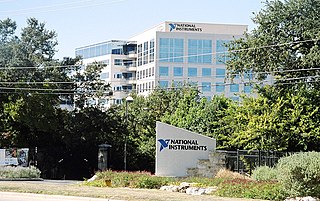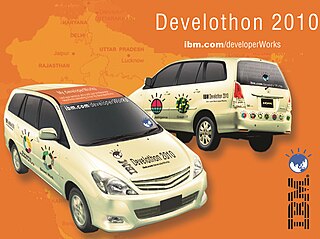
Apache Tomcat, often referred to as Tomcat Server,developed by the Apache Software Foundation (ASF). Tomcat implements several Java EE specifications including Java Servlet, JavaServer Pages (JSP), Java EL, and WebSocket, and provides a "pure Java" HTTP web server environment in which Java code can run.

Project Athena was a joint project of MIT, Digital Equipment Corporation, and IBM to produce a campus-wide distributed computing environment for educational use. It was launched in 1983, and research and development ran until June 30, 1991, eight years after it began. As of 2017, Athena is still in production use at MIT. It works as software that makes a machine a thin client, that will download educational applications from the MIT servers on demand.

National Instruments Corporation, or NI, is an American multinational company with international operation. Headquartered in Austin, Texas, it is a producer of automated test equipment and virtual instrumentation software. Common applications include data acquisition, instrument control and machine vision.

Software Freedom Day (SFD) is an annual worldwide celebration of Free Software organized by Digital Freedom Foundation. SFD is a public education effort with the aim of increasing awareness of Free Software and its virtues, and encouraging its use.
IBM Developer is a free web-based professional network and technical resource center from IBM for software developers, IT professionals, and students worldwide. The site attracts over 5 million unique visitors per month in 195 countries, and is designed to help users develop and master skills, solve problems, collaborate with peers, and stay ahead of the latest trends in open standards and IBM technologies.
WebCT or Blackboard Learning System, now owned by Blackboard, is an online proprietary virtual learning environment system that is licensed to colleges and other institutions and used in many campuses for e-learning. To their WebCT courses, instructors can add such tools as discussion boards, mail systems, and live chat, along with content including documents and web pages. The latest versions of this software are now called Webcourses. WebCT is significant in that it was the world's first widely successful course management system for higher education. At its height, it was in use by over 10 million students in 80 countries.

Carnegie Mellon Silicon Valley is a branch campus of Carnegie Mellon University located in the heart of Silicon Valley in Mountain View, California. It was established in 2002 at the NASA Ames Research Center in Moffett Field. The campus offers full-time and part-time professional Masters programs in Electrical And Computer Engineering, Software Engineering and Software Management, various bi-coastal Masters programs in Information Technology, and a bi-coastal Ph.D. program in Electrical and Computer Engineering. One key differentiator between programs in the traditional Pittsburgh campus and the new Silicon Valley campus is a new focus on project-centered learning by doing approach to education.
A hackathon is a design sprint-like event in which computer programmers and others involved in software development, including graphic designers, interface designers, project managers, and others, often including domain experts, collaborate intensively on software projects.

Students for Free Culture, formerly known as FreeCulture.org, is an international student organization working to promote free culture ideals, such as cultural participation and access to information. It was inspired by the work of former Stanford, now Harvard, law professor Lawrence Lessig, who wrote the book Free Culture, and it frequently collaborates with other prominent free culture NGOs, including Creative Commons, the Electronic Frontier Foundation, and Public Knowledge. Students for Free Culture has over 30 chapters on college campuses around the world, and a history of grassroots activism.
Netaji Subhash Engineering College or NSEC is a graduate and undergraduate engineering college of eastern India located in Kolkata, West Bengal, India. Established in 1998, it is situated at Techno City, Panchpota, Garia in the southern part of Kolkata. The institute is noted for its strong academic foundations and ranks as one of the top engineering colleges in the state of West Bengal.
An open-source curriculum (OSC) is an online instructional resource that can be freely used, distributed and modified. OSC is based on the open-source practice of creating products or software that opens up access to source materials or codes. Applied to education, this process invites feedback and participation from developers, educators, government officials, students and parents and empowers them to exchange ideas, improve best practices and create world-class curricula. These "development" communities can form ad-hoc, within the same subject area or around a common student need, and allow for a variety of editing and workflow structures.

The Linux Foundation (LF) is a non-profit technology consortium founded in 2000 as a merger between Open Source Development Labs and the Free Standards Group to standardize Linux, support its growth, and promote its commercial adoption. It also hosts and promotes the collaborative development of open source software projects.
Liferay, Inc., is an open-source company that provides free documentation and paid professional service to users of its software. Mainly focused on enterprise portal technology, the company has its headquarters in Diamond Bar, California, United States.
The Microsoft Open Specification Promise is a promise by Microsoft, published in September 2006, to not assert its patents, in certain conditions, against implementations of a certain list of specifications.
GitHub is a web-based hosting service for version control using Git. It is mostly used for computer code. It offers all of the distributed version control and source code management (SCM) functionality of Git as well as adding its own features.

NIIT Limited is an Indian Multinational company that offers learning management and training delivery solutions to corporations, institutions and individuals. It has three main lines of business worldwide: Corporate Learning Group (CLG), Skills and Careers Group (SNC), and School Learning Group (SLG).
The open-source-software movement is a movement that supports the use of open-source licenses for some or all software, a part of the broader notion of open collaboration. The open-source movement was started to spread the concept/idea of open-source software. Programmers who support the open-source-movement philosophy contribute to the open-source community by voluntarily writing and exchanging programming code for software development. The term "open source" requires that no one can discriminate against a group in not sharing the edited code or hinder others from editing their already-edited work. This approach to software development allows anyone to obtain and modify open-source code. These modifications are distributed back to the developers within the open-source community of people who are working with the software. In this way, the identities of all individuals participating in code modification are disclosed and the transformation of the code is documented over time. This method makes it difficult to establish ownership of a particular bit of code but is in keeping with the open-source-movement philosophy. These goals promote the production of high-quality programs as well as working cooperatively with other similarly-minded people to improve open-source technology. This led to software such as MediaWiki, the software with which the Wikipedia website is built.

Develothon is a developer skill marathon aimed at helping the software developer community in India develop skills in newer technology areas. The name Develothon is derived from combining 'developerWorks' and 'Marathon'.

Blackboard Inc. is an educational technology company with corporate headquarters in Washington, D.C.. It is known for Blackboard Learn, a learning management system.










